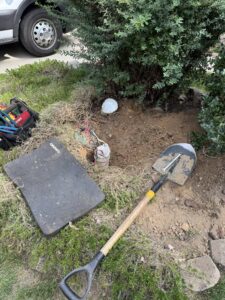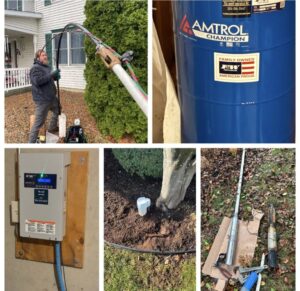Here is Everything You Need to Know About Water Well Inspections
Water well inspections are a critical component of responsible well ownership that many homeowners overlook until problems arise. Whether you’re buying a home with a private well, selling property with well water, or simply ensuring your family’s continued access to safe drinking water, understanding the inspection process is essential for protecting your investment and health.
What Is a Water Well Inspection?
A water well inspection is a comprehensive evaluation of your well system’s condition, safety, and performance. Unlike basic water quality testing, a thorough inspection examines both the physical components of your well system and the quality of water it produces. Professional inspections identify potential problems before they become costly emergencies and ensure your well continues to provide safe, reliable water service.
Well inspections typically include evaluation of the wellhead, casing, cap, electrical systems, pump performance, pressure tank function, and comprehensive water testing. Regular well maintenance and inspection can prevent most serious well problems and extend your system’s lifespan significantly.
When Do You Need a Well Inspection?
Real Estate Transactions
Most lenders and real estate professionals require well inspections during property transactions involving private wells. These inspections protect both buyers and sellers by documenting the well’s condition and identifying any issues that need addressing before closing. A comprehensive inspection can reveal problems that might not be apparent during a casual property viewing.
Annual Preventive Inspections
Even if you’re not buying or selling property, annual well inspections are highly recommended for all private well owners. Regular well servicing includes inspection components that can catch problems early, potentially saving thousands in repair costs.
Problem Identification
Schedule an immediate inspection if you notice:
- Changes in water taste, odor, or appearance
- Decreased water pressure or flow
- Unusual pump cycling or noises
- Cloudy or discolored water
- Bacterial contamination concerns
Troubleshooting well water issues often begins with a professional inspection to identify root causes rather than just treating symptoms.
Components of a Comprehensive Well Inspection
Physical System Evaluation
A thorough physical inspection examines all visible components of your well system. This includes checking the wellhead for proper sealing, inspecting the well cap for cracks or damage, and evaluating the casing for signs of corrosion or structural problems. The inspector will also examine electrical connections, pressure switches, and control panels for safety and proper operation.
Pressure tank inspection is crucial, as tank problems can cause pump issues that require immediate repair. The inspector will check tank pressure, examine the bladder or diaphragm, and test pressure switch operation.
Pump Performance Testing
Well pump evaluation is a critical component of any inspection. Testing pump efficiency helps determine whether your pump is operating at optimal levels or showing signs of wear that could lead to failure.
Pump testing includes:
- Flow rate measurements
- Pressure testing at various flow rates
- Electrical current draw analysis
- Pump cycling evaluation
- Static and dynamic water level measurements
Water Quality Testing
No well inspection is complete without comprehensive water testing. Standard testing includes bacterial analysis, mineral content, pH levels, and testing for common contaminants like nitrates, arsenic, and other potentially harmful substances.
Water quality issues often require specific treatment solutions. Addressing bacterial contamination may require UV sterilization or chlorination, while removing iron and hard minerals might need specialized filtration systems.
What Inspectors Look For
Safety Concerns
Well inspectors prioritize safety issues that could pose immediate risks to health or property. This includes checking for proper electrical grounding, ensuring wellhead security to prevent contamination, and identifying any structural problems that could compromise the well’s integrity.
Contamination pathways are carefully evaluated, including surface drainage around the wellhead, potential sources of pollution nearby, and the condition of sealing systems that prevent surface water from entering the well.
System Efficiency
Efficiency problems waste energy and can indicate developing issues. Inspectors evaluate pump performance, pressure tank operation, and overall system efficiency to identify opportunities for improvement and potential problems.
Understanding what type of pump your well needs is crucial for optimal efficiency, and inspectors can recommend upgrades when appropriate.
Maintenance Needs
Professional inspectors identify maintenance needs that homeowners might miss. This includes recommendations for water tank servicing, pump maintenance schedules, and suggestions for improving system reliability.
Common Issues Found During Inspections
Wellhead and Casing Problems
Many inspections reveal problems with well caps, casing damage, or improper sealing that could allow surface contamination. These issues are often easily correctable but can cause serious problems if left unaddressed.
Pump and Pressure Issues
Pump problems are among the most common findings during well inspections. Identifying a failing well before it stops working can prevent emergency situations and allow for planned repairs rather than costly emergency calls.
Water Quality Concerns
Water quality issues range from minor aesthetic problems to serious health concerns. Common findings include bacterial contamination, high mineral content, pH imbalances, and presence of contaminants that require treatment.
The Inspection Report
A comprehensive well inspection report should provide detailed findings, recommendations, and prioritized action items. The report typically includes:
- Executive summary of key findings
- Detailed component evaluations
- Water test results and analysis
- Recommended repairs or improvements
- Maintenance schedule suggestions
- Cost estimates for recommended work
Understanding your inspection report helps you make informed decisions about repairs, upgrades, and ongoing maintenance needs.
Choosing a Qualified Inspector
Not all well inspectors are created equal. Look for inspectors with proper licensing, insurance, and experience with your type of well system. The inspector should be familiar with local water quality issues and regulatory requirements.
Questions to ask potential inspectors include:
- What certifications and licenses do you hold?
- How long have you been inspecting wells?
- What does your inspection include?
- Do you provide written reports?
- Can you recommend qualified repair contractors?
After the Inspection
Once you receive your inspection report, prioritize recommended actions based on safety and urgency. Address immediate safety concerns first, followed by efficiency improvements and preventive maintenance items.
If water quality issues are identified, understanding different purification systems can help you choose appropriate treatment options. Upgrading your water purification system may be necessary to address specific contaminants or improve overall water quality.
Emergency Situations
Sometimes inspections reveal problems requiring immediate attention. Emergency well repairs may be necessary if safety issues are discovered or if system failure is imminent.
If your inspection reveals that your well is running dry or has other serious problems, having temporary solutions ready can help maintain water access until permanent repairs are completed.
Cost Considerations
While well inspections require an upfront investment, they typically save money by identifying problems before they become emergencies. The cost of a professional inspection is minimal compared to the potential cost of emergency repairs or system replacement.
Consider inspection costs as insurance for your water system investment. Early problem identification allows for planned repairs during convenient times rather than emergency situations that often cost significantly more.
Conclusion
Water well inspections are essential for maintaining safe, reliable water service and protecting your property investment. Whether required for real estate transactions or performed as part of preventive maintenance, professional inspections provide valuable insights into your well system’s condition and performance.
At TLC Well Service, we provide comprehensive well inspections that examine every aspect of your water system. Our experienced team uses advanced testing equipment and follows industry best practices to ensure thorough, accurate evaluations.
Don’t wait for problems to develop – schedule your well inspection today. Our comprehensive well services include everything from routine inspections to emergency repairs, ensuring your family always has access to safe, clean water.
Regular inspections are your best defense against costly repairs and water quality problems. Contact our professional team to schedule your comprehensive well inspection and ensure your water system continues to serve your family reliably for years to come.
Call Now (574) 314-2447



